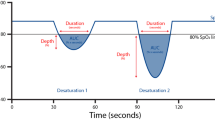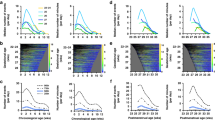Abstract
We studied the effect of blood transfusion on the frequency of apnoea, bradycardia and hypoxaemia in 21 spontaneously breathing preterm infants with a median gestational age at birth of 28 (range 23–31) weeks. Age at time of study was 22 days (3–84), weight 925 g (640–2120). The patients exhibited frequent episodes of bradycardia and/or hypoxaemia and were anaemic (median haemoglobin level 109 (82–120) g/l). One infant received two transfusions and was thus studied twice. Four-hour recordings of pulse oximeter saturation (SpO2), pulse waveforms, transcutaneous oxygen pressure, electrocardiogram, breathing movements and nasal airflow were performed immediately before and after transfusion, and again after a further interval of 12 h. Recordings were analysed for isolated and periodic apnoeas (> 4 s), bradycardias (heart rate < 2/3 of baseline), and episodic desaturation (SpO2≤ 80%). There were no significant changes in the frequency, severity and/or duration of apnoea, bradycardia or desaturation following transfusion. The average SpO2 nadir reached during each desaturation, however, increased by 3% following transfusion (P < 0.05), and there was a trend towards shorter desaturations.
Conclusion The occurrence of frequent episodes of apnoea, bradycardia and/or hypoxaemia does not, on its own, justify a blood transfusion in moderately anaemic preterm infants.
Similar content being viewed by others
Explore related subjects
Discover the latest articles and news from researchers in related subjects, suggested using machine learning.Author information
Authors and Affiliations
Additional information
Received: 25 July 1996 / Accepted: 24 September 1996
Rights and permissions
About this article
Cite this article
Poets, C., Pauls, U. & Bohnhorst, B. Effect of blood transfusion on apnoea, bradycardia and hypoxaemia in preterm infants. Eur J Pediatr 156, 311–316 (1997). https://doi.org/10.1007/s004310050607
Issue Date:
DOI: https://doi.org/10.1007/s004310050607




